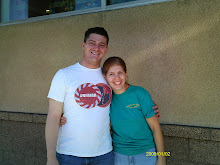On the armchair's other side rests a stunted fridge, empty but for expired, frozen noodles and cold onion husks. To mirror this emptiness, the only kitchen cabinet in the unit fills itself with one shiny metal kettle, three pans, and a sprouting bag of potatoes. Above, where the dishes are kept, rest two lonely plates and one spoon, fork, and knife each. Just enough for one last meal: breakfast.
Tomorrow's moving day.
As I sit here in the quiet dimness, the air still without Frankie's shrill bellows, it's hard to take in what I know the morrow surely brings. The abortion of a school year, just three months into its gestation. Fractured trust from parents and staff alike. A cancellation of a contract so newly signed. Oh what shattering news comes swiftly in a fortnight!
Two Mondays ago, the sixteenth, I was still oblivious to the financial storm clouds looming over my tiny hagwon. My plan then, as I had so recently informed my Texas family, was to see them in three months after working through my final summer in Korea. I had known I was coming home; I just thought it would be a little further away than now.
Two days later, the message trickled down from management that the worst had hit: Barely afloat for the last several months as students oozed through our cracks and into other hagwons, Apple Tree could no longer afford to keep from drowning in its overhead costs. Its captain would let it sink on the 31. And my apartment would go down with it.
The news didn't hit me as tragically as it had some. If my manager had called me into her office to tell me lunch was ready, I'd have felt the same. What has replaced the sense of devastation is instead this feeling of expectancy.
Just the night before I had explained to a close friend about my apprehensiveness of the hagwon's current progress and its plans to revamp the curriculum. And as soon as I told her the news, the friend quietly replied, "Wow! ...God does indeed have plans for you to come home early." And I have to agree that she's right. True, losing one's job, one's place to live, and one's alien registration within two weeks is an unstable position at best. But no matter what others might say, I can see the hand of God even through the uncertainty.
I see Him opening doors for me to participate in a missions trip to Thailand that I wouldn't have ever tried to plan on my own. I see Him strategically placing me in a country town with a woman who unknowingly desires the blessings of the LORD, to witness of His great love and His gospel. And I see Him giving me opportunity to pray over and speak life into those He brings across my path. I saw the LORD guiding me even as I came to Korea, and I marvel at His hand over me now.
The thing that amazes me the most at the close of my time here is the willingness of those whom God has deliberately put in my path to go out of their way to provide for me: Already I've had three close friends in Dongtan volunteer their homes for the next three weeks, one of them visibly concerned about where I would store my luggage. Yet another woman has suggested I stay the weekend with her in Hongcheon. Still a third couple suggested I could crash at their place for a day or two if I needed to head down to Chungju. As I hear the offers spoken, I cannot help but know that these are urgings from the Holy Spirit and I cannot help but feel the LORD's great love for me throughout them.
It is the fullness of His time.

